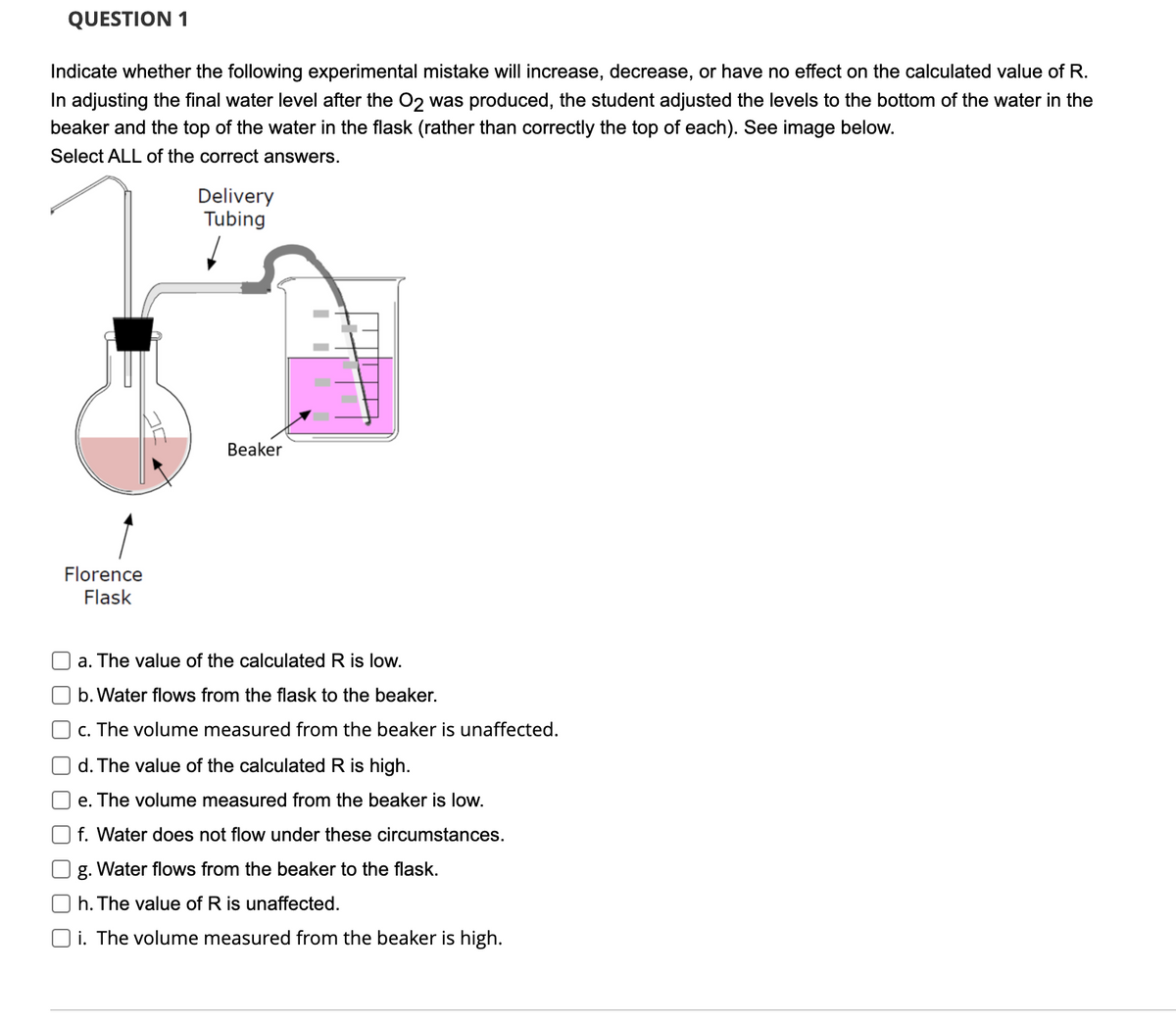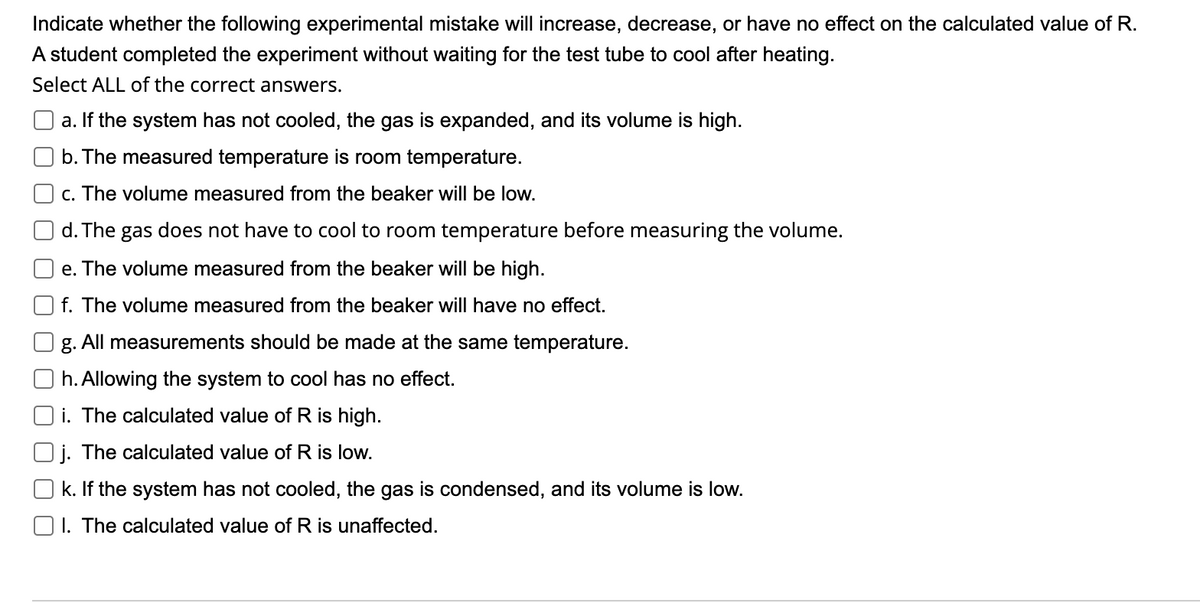Indicate whether the following experimental mistake will increase, decrease, or have no effect on the calculated value of R. In adjusting the final water level after the O2 was produced, the student adjusted the levels to the bottom of the water in the beaker and the top of the water in the flask (rather than correctly the top of each). See image below. Select ALL of the correct answers. Delivery Tubing Beaker Florence Flask O a. The value of the calculated R is low. O b. Water flows from the flask to the beaker. O c. The volume measured from the beaker is unaffected. d. The value of the calculated R is high. O e. The volume measured from the beaker is low. f. Water does not flow under these circumstances. g. Water flows from the beaker to the flask. O h. The value of R is unaffected. O i. The volume measured from the beaker is high. O O O 0 00000
Indicate whether the following experimental mistake will increase, decrease, or have no effect on the calculated value of R. In adjusting the final water level after the O2 was produced, the student adjusted the levels to the bottom of the water in the beaker and the top of the water in the flask (rather than correctly the top of each). See image below. Select ALL of the correct answers. Delivery Tubing Beaker Florence Flask O a. The value of the calculated R is low. O b. Water flows from the flask to the beaker. O c. The volume measured from the beaker is unaffected. d. The value of the calculated R is high. O e. The volume measured from the beaker is low. f. Water does not flow under these circumstances. g. Water flows from the beaker to the flask. O h. The value of R is unaffected. O i. The volume measured from the beaker is high. O O O 0 00000
Chemistry
10th Edition
ISBN:9781305957404
Author:Steven S. Zumdahl, Susan A. Zumdahl, Donald J. DeCoste
Publisher:Steven S. Zumdahl, Susan A. Zumdahl, Donald J. DeCoste
Chapter1: Chemical Foundations
Section: Chapter Questions
Problem 1RQ: Define and explain the differences between the following terms. a. law and theory b. theory and...
Related questions
Question

Transcribed Image Text:QUESTION 1
Indicate whether the following experimental mistake will increase, decrease, or have no effect on the calculated value of R.
In adjusting the final water level after the O2 was produced, the student adjusted the levels to the bottom of the water in the
beaker and the top of the water in the flask (rather than correctly the top of each). See image below.
Select ALL of the correct answers.
Delivery
Tubing
Beaker
Florence
Flask
a. The value of the calculated R is low.
b. Water flows from the flask to the beaker.
c. The volume measured from the beaker is unaffected.
d. The value of the calculated R is high.
e. The volume measured from the beaker is low.
f. Water does not flow under these circumstances.
g. Water flows from the beaker to the flask.
h. The value of R is unaffected.
O i. The volume measured from the beaker is high.

Transcribed Image Text:Indicate whether the following experimental mistake will increase, decrease, or have no effect on the calculated value of R.
A student completed the experiment without waiting for the test tube to cool after heating.
Select ALL of the correct answers.
a. If the system has not cooled, the gas is expanded, and its volume is high.
b. The measured temperature is room temperature.
c. The volume measured from the beaker will be low.
d. The gas does not have to cool to room temperature before measuring the volume.
e. The volume measured from the beaker will be high.
f. The volume measured from the beaker will have no effect.
g. All measurements should be made at the same temperature.
h. Allowing the system to cool has no effect.
i. The calculated value of R is high.
j. The calculated value of R is low.
k. If the system has not cooled, the gas is condensed, and its volume is low.
O1. The calculated value of R is unaffected.
Expert Solution
This question has been solved!
Explore an expertly crafted, step-by-step solution for a thorough understanding of key concepts.
This is a popular solution!
Trending now
This is a popular solution!
Step by step
Solved in 2 steps with 3 images

Knowledge Booster
Learn more about
Need a deep-dive on the concept behind this application? Look no further. Learn more about this topic, chemistry and related others by exploring similar questions and additional content below.Recommended textbooks for you

Chemistry
Chemistry
ISBN:
9781305957404
Author:
Steven S. Zumdahl, Susan A. Zumdahl, Donald J. DeCoste
Publisher:
Cengage Learning

Chemistry
Chemistry
ISBN:
9781259911156
Author:
Raymond Chang Dr., Jason Overby Professor
Publisher:
McGraw-Hill Education

Principles of Instrumental Analysis
Chemistry
ISBN:
9781305577213
Author:
Douglas A. Skoog, F. James Holler, Stanley R. Crouch
Publisher:
Cengage Learning

Chemistry
Chemistry
ISBN:
9781305957404
Author:
Steven S. Zumdahl, Susan A. Zumdahl, Donald J. DeCoste
Publisher:
Cengage Learning

Chemistry
Chemistry
ISBN:
9781259911156
Author:
Raymond Chang Dr., Jason Overby Professor
Publisher:
McGraw-Hill Education

Principles of Instrumental Analysis
Chemistry
ISBN:
9781305577213
Author:
Douglas A. Skoog, F. James Holler, Stanley R. Crouch
Publisher:
Cengage Learning

Organic Chemistry
Chemistry
ISBN:
9780078021558
Author:
Janice Gorzynski Smith Dr.
Publisher:
McGraw-Hill Education

Chemistry: Principles and Reactions
Chemistry
ISBN:
9781305079373
Author:
William L. Masterton, Cecile N. Hurley
Publisher:
Cengage Learning

Elementary Principles of Chemical Processes, Bind…
Chemistry
ISBN:
9781118431221
Author:
Richard M. Felder, Ronald W. Rousseau, Lisa G. Bullard
Publisher:
WILEY